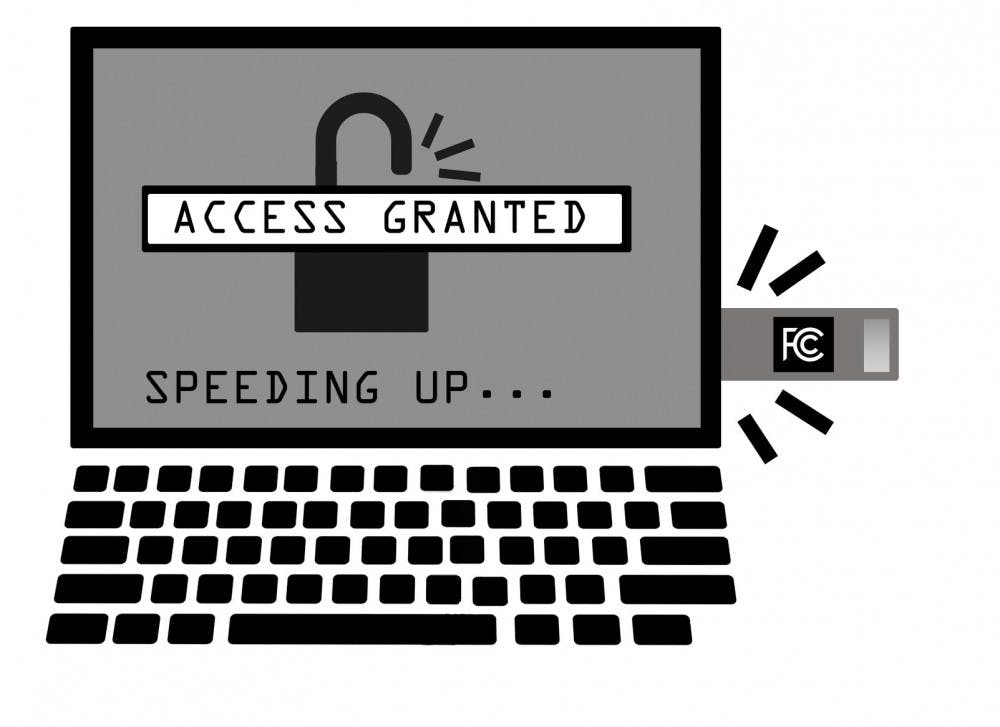If you’re one of the Internet junkies like the rest of us college kids, it’s time to listen up.
Supporters of net neutrality came closer to victory when the Federal Communications Commission voted 3-2 for a plan that will allow the agency to ?regulate the Internet as a public utility.
In the plan is a rule that forbids Internet service providers from offering paid prioritization, dissolving the possibility that ISPs will offer more bandwidth to higher-paying customers, dealing a hefty blow to the telecom companies.
In an era of rapid technology and communications advancement, the Internet is becoming more of a necessity every day, and it should be accessible to everyone.
Those for net neutrality argue they’d rather have the FCC regulating the Internet than telecom companies dictating what users can have access to.
These companies have been notorious for strong-arm methods that resemble more of mobster customs rather than corporate etiquette.
John Oliver, the host of “Last Week Tonight,” stirred the net neutrality pot when he critiqued telecom companies and told viewers to email the FCC.
Oliver brought to light Comcast’s bully strategy of decreasing download speed for Netflix during contract ?negotiations. He listed the FCC comments page on his show and was quoted saying to Internet commenters, “Seize your moment, my lovely trolls. Turn on caps lock, and fly, my pretties.”
As humorous as Oliver makes the situation, the Internet is no laughing matter.
Sure, GIFs of our favorite TV moments, cat videos and viral phenomenon like the black and blue/gold and white dress are hilarious. But in the age of the digital world, life without the ?Internet is almost nonexistent.
But what exactly is the FCC ?implementing?
By regulating the Internet, the FCC is requiring ISPs to offer the same product. This virtually removes competition from the economy and places the government in charge of regulating ?Internet prices.
But don’t fret — Internet users will still have the option of using companies like Verizon, Comcast, AT&T and others. But you may not want to.
Local government in Chattanooga, Tenn., helped implement Internet services that work at 50 times the average speed in other places around the ?country for less than $70 a month.
Now termed “Gig City,” Chattanooga allowed government bureaucracy to fund and create an Internet network that works so fast it only takes 33 seconds to download a two-hour movie in HD. Taxpayers own this ?ultrahigh-speed Internet that uses fiber-optic cables for maximum efficiency.
The FCC won’t be able to slow down file-sharing sites like Comcast did for customers using BitTorrent. Technically, file-sharing sites aren’t illegal, even though most of us use them to access ?pirated movies and music.
You’ll no longer be at the mercy of AT&T, Sprint, T-Mobile and Verizon from blocking tethering apps, which link your phone to other devices like your computer or tablet.
AT&T won’t be able to stop video chats like FaceTime as it’s done in the past. Verizon can’t block the PayPal digital fingerprint authorization because they want to promote their own ?payment app, Softcard.
Yes, we are giving up our Internet, one of the staples of digital freedom, for regulation.
We’re essentially giving the government the green light to peek in on our network activity. But none of us are blind to the works of the NSA, and we know they’ve been spying on us for a ?while now.
The Editorial Board believes net neutrality implemented by the FCC is the lesser of the two evils.
Our wallets and channel choices have already been victim to ?larger-than-life telecom companies.
Enough is enough. Let’s use the FCC as our net neutrality guardian and keep ?downloading stupid memes.




